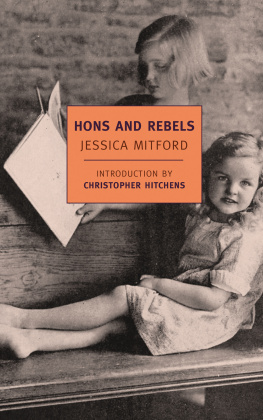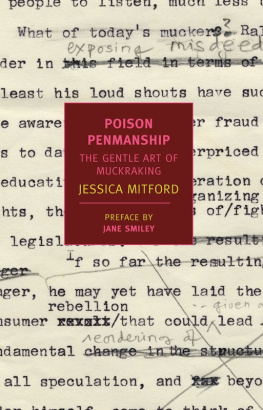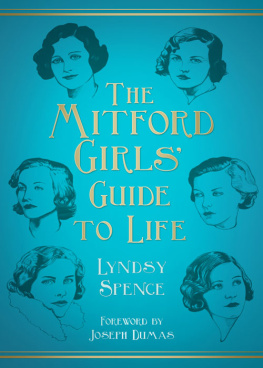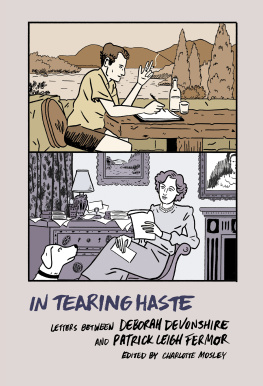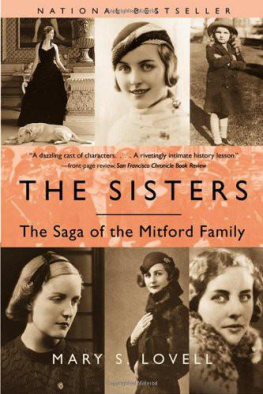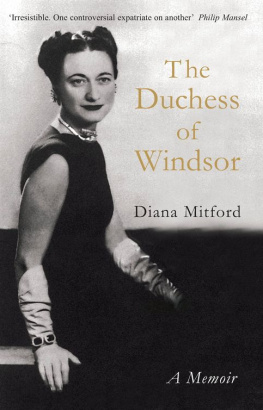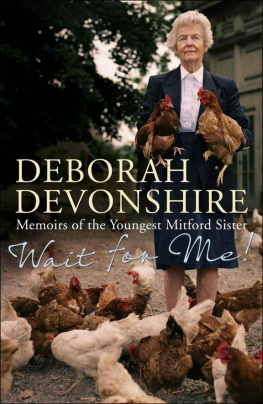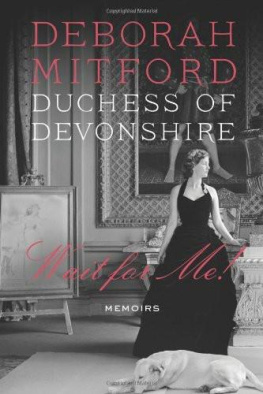JESSICA MITFORD (19171996) was the daughter of Lord and Lady Redesdale, and she and her five sisters and one brother grew up in isolation on their parents Cotswold estate. Rebelling against her familys hidebound conservatism, Mitford became an outspoken socialist and, with her second cousin and husband-to-be Esmond Romilly, ran away to fight against Franco in the Spanish Civil War. Romilly was killed in World War II, and Mitford moved to America, where she married the lawyer and political activist Robert Treuhaft. A brilliant muckraking journalist, Jessica Mitford was the author of, among many other books, a study of the funeral industry, The American Way of Death, and Kind and Unusual Punishment: The Prison Business. She died at the age of seventy-eight while working on a follow-up to The American Way of Death, for which, with characteristic humor, she proposed the title Death Warmed Over.
CHRISTOPHER HITCHENS (1949-2011) was a columnist for Vanity Fair as well as the author of more than twenty-five books, including Letters to a Young Contrarian, Why Orwell Matters, and God Is Not Great.
1
T HE C OTSWOLD COUNTRY , old and quaint, ridden with ghosts and legends, is today very much on the tourist route. After doing Oxford, it seems a shame not to travel on another twenty miles or so to see some of the historic villages with the picturesque names Stow-on-the-Wold, Chipping Norton, Minster Lovell, Burford. The villages themselves have responded prettily to all this attention. Burford has, indeed, become a sort of minor Stratford-on-Avon, its ancient inns carefully made up to combine modern comfort with a Tudor air. You can even get Coca-Cola there, though it may be served at room temperature, and the little shops are full of Souvenirs of Historic Burford, bearing the unobtrusive legend Made in Japan.
For some reason Swinbrook, only three miles away, seems to have escaped the tourist trade, and has remained as I remember it more than thirty years ago. In the tiny village post office the same four kinds of sweets toffee, acid drops, Edinburgh Rock and butterscotch are still displayed in the same four large cut-glass jars ranged in the window. Hanging in the back of the shop, as they have hung for two generations, are bright framed prints of contrasting Victorian beauties, one a golden-haired, delicate young lady with luminous blue eyes, her soft white shoulders draped in a pre-Raphaelite something, the other a roguishly pretty gypsy maiden whose incredibly thick black hair falls in great round curls. As a child, I always thought them amazingly like Nancy and Diana, my older sisters. Next to these, the unnaturally pink and white faces of King George V and Queen Mary still gaze benignly at the world.
The only other public buildings are a one-room school-house and the church. Around these a dozen gray stone cottages lie huddled like Cotswold sheep, quiet and timeless. Inside the church, the rows of varnished oak pews contributed by my father after the first World War, out of the proceeds of a successful bet on the Grand National still seem to strike a too modern note in contrast to the medieval flagstones, buttresses, pillars and arches. The Redesdale coat of arms, bearing its blandly self-assured motto, God Careth For Us, which hangs above the family pews, still looks a little too shiny and contemporary beside the crumbling gray stone memorials to an earlier Swinbrook family, whose statues have lain stiffly in place for four hundred years.
Two miles up the hill from Swinbrook village stands a large rectangular gray structure of three stories. Its style is neither modern nor traditional nor simulated antique; it bears rather the utilitarian look of frankly institutional architecture. It could be a small barracks, a girls boarding school, a private lunatic asylum, or, in America, a country club. There has been more than a suspicion of all of these functions in its short history. It is actually Swinbrook House, built by my father to satisfy the needs, as then seen, of a family with seven children. We moved there in 1926, when I was nine years old.
Swinbrook had many aspects of a fortress or citadel of medieval times. From the point of view of the inmates it was self-contained in the sense that it was neither necessary, nor generally possible, to leave the premises for any of the normal human pursuits. Schoolroom with governess for education, riding stables and tennis court for exercise, seven of us children for mutual human companionship, the village church for spiritual consolation, our bedrooms for hospital wards even when operations were necessary all were provided, either in the house itself or within easy walking distance. From the point of view of outsiders entry, in the rather unlikely event that they might seek it, was an impossibility. According to my father, outsiders included not only Huns, Frogs, Americans, blacks and all other foreigners, but also other peoples children, the majority of my older sisters acquaintances, almost all young men in fact, the whole teeming population of the earths surface, except for some, though not all, of our relations and a very few tweeded, red-faced country neighbors to whom my father had for some reason taken a liking.
In a way, he was not prejudiced in the modern sense. Since the thirties, this term has come to mean the focussing of passionate hatred against a selected race or creed, Negro, Oriental, or Jew; the word discrimination has even become almost synonymous with prejudice. My father did not discriminate; in fact, he was in general unaware of distinctions between different kinds of foreigners. When one of our cousins married an Argentinian of pure Spanish descent, he commented, I hear that Robins married a black.
Unceasing tug-of-war was waged with Farve by Nancy, Pam and Diana, the three grown-up daughters, to be allowed to have their friends to stay. Since my mother rather enjoyed having visitors she was often an ally, and these battles were frequently won. My brother Toms friends portly, blond young men known by Nancy as the Fat Fairs were an exception; they were always allowed.
For the three younger children, Unity, Debo and me, the company of one another was thought to be amply sufficient. Except for very rare visits from cousins, the three of us were brought up in complete isolation from our contemporaries. My mother thought the company of other children unnecessary and overstimulating. Nevertheless, there had been a time when we had been taken on rare occasions to birthday parties or Easter egg hunts at the homes of neighboring county families.
Even this limited social life came to an abrupt halt, never to be renewed, when I was nine and I inadvertently caused its cessation. I was enrolled in a dancing class which met weekly, rotating among various neighbors houses. Little girls in organdy dresses and cashmere shawls, accompanied by starched nannies, were delivered by their chauffeurs at the appointed place to await the teacher, who came out from Oxford by bus. One fateful afternoon the teacher was an hour late, and I took the opportunity to lead the other children up to the roof, there to impart some delightful information that had just come my way concerning the conception and birth of babies. And even the King and Queen do it! I added impressively. The telling was a great success, particularly as I couldnt help making up a few embellishments as I went along. They begged to hear more, and swore solemnly on the Bible never to repeat a word to a living soul. Several weeks later my mother sent for me. Her face was like thunder; one look, and I knew what must have happened. In the dreadful scolding that followed, I learned that one of the little girls had wakened night after night with screaming nightmares. She had grown pale and thin, and seemed on the verge of a mental crisis. Finally, her governess had pried the truth out of her, and had found out about the horrifying session on the roof. (Luckily for me, she did not reveal that I had brought the King and Queen into it.) Just retribution quickly followed. My participation in the dancing class was abruptly terminated; it was clear to everyone, even to me, that I couldnt be considered fit company for nice children after that. The enormity of my ill-advised act, the scope and enduring quality of its impact, was such that years later, when I was a debutante of seventeen, I learned from an older cousin that two young men of the neighborhood were still forbidden to associate with me.

